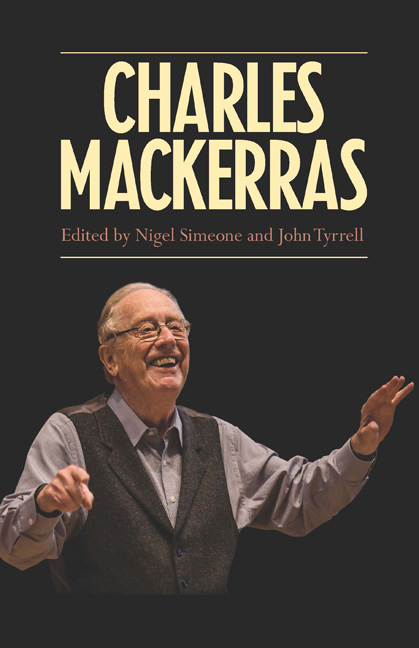Book contents
- Frontmatter
- Dedication
- Contents
- List of Illustrations
- List of Abbreviations
- Preface and Acknowledgments
- About the Contributors
- Charles Mackerras: A Chronology
- Prologue: A Eulogy for Charles
- 1 An Immense Stylist Evolves: 1947–87
- 2 A Personal Portrait of Charles Mackerras
- 3 Mackerras and Janáček
- 4 Goat's Milk in Vienna: Three Memorable Meetings
- 5 The Lion: Charles Mackerras
- 6 ‘The Musical Values of Opera’: WNO, 1987–92
- 7 Triumphs and Tribulations: Opera, 1993–2001
- 8 Rethinking Old Favourites: Opera, 2002–10
- 9 The Last Great ‘Czech’ Conductor
- 10 Reminiscences of a Friend and Colleague
- 11 Reconstructing a Better Version of The Greek Passion
- 12 Reconstructing Sullivan's Cello Concerto
- 13 Three Orchestras
- 14 Coda
- Appendix 1 Mackerras in Performance
- Appendix 2 Desert Island Lists
- Discography
- Bibliography
- Editions and Arrangements by Charles Mackerras
- Index
14 - Coda
Published online by Cambridge University Press: 05 May 2015
- Frontmatter
- Dedication
- Contents
- List of Illustrations
- List of Abbreviations
- Preface and Acknowledgments
- About the Contributors
- Charles Mackerras: A Chronology
- Prologue: A Eulogy for Charles
- 1 An Immense Stylist Evolves: 1947–87
- 2 A Personal Portrait of Charles Mackerras
- 3 Mackerras and Janáček
- 4 Goat's Milk in Vienna: Three Memorable Meetings
- 5 The Lion: Charles Mackerras
- 6 ‘The Musical Values of Opera’: WNO, 1987–92
- 7 Triumphs and Tribulations: Opera, 1993–2001
- 8 Rethinking Old Favourites: Opera, 2002–10
- 9 The Last Great ‘Czech’ Conductor
- 10 Reminiscences of a Friend and Colleague
- 11 Reconstructing a Better Version of The Greek Passion
- 12 Reconstructing Sullivan's Cello Concerto
- 13 Three Orchestras
- 14 Coda
- Appendix 1 Mackerras in Performance
- Appendix 2 Desert Island Lists
- Discography
- Bibliography
- Editions and Arrangements by Charles Mackerras
- Index
Summary
In his obituary in Opera (September 2010), Lord Harewood wrote that ‘The word “polymath” might have been coined to describe Charles's activities as a musician. I think he was the best conductor of Mozart of my time in the theatre, and undoubtedly the best at Handel [whose] operas never sounded so good without him. I emphasise these virtues, but of course we all think of him as the man who unlocked the secrets of Janáček and his operas.’ He ended by saying that he was ‘probably the most complete opera conductor of his generation’. This was no exaggeration, and to it should be added his achievements – especially in the last two decades of his life – as a symphonic conductor whose performances of standard repertoire were almost always full of new insights, as well as an innate sense of musical drama. He did not know the meaning of complacency in his conducting – there was a duty to the composer that had to be honoured. Asked why he always used a score, he once remarked that there were always new things to discover, even as the performance was going along.
When Charles married Judy, they wanted to start a family, though Charles was worried that children might distract him from music – so the responsibility of their upbringing would rest firmly with Judy. He was not being selfish about this, but merely explaining just how central music was to his existence. To underline the point, he recalled his first trip to Prague for a Czech television documentary in 2009: ‘I always say I had two honeymoons: one with my wife and the other one was with Janáček!’
Their first daughter, Fiona, was born on 8 August 1949 and their second, Catherine (Cathy), arrived the following year on 17 November – Charles's birthday. It was Judy who dealt with all the practicalities of bringing up two children. The girls saw their father as a kindly figure, but he was often away, and usually had his head in a score when he was at home.
- Type
- Chapter
- Information
- Charles Mackerras , pp. 194 - 204Publisher: Boydell & BrewerPrint publication year: 2015



